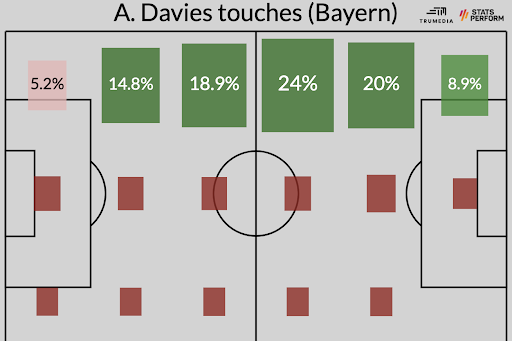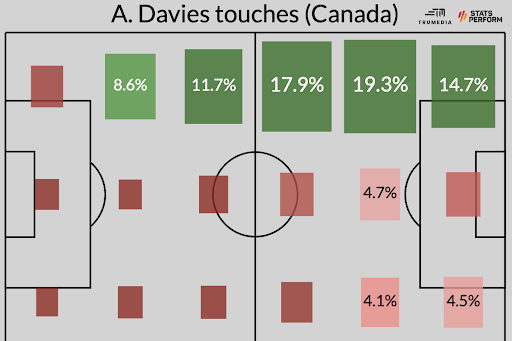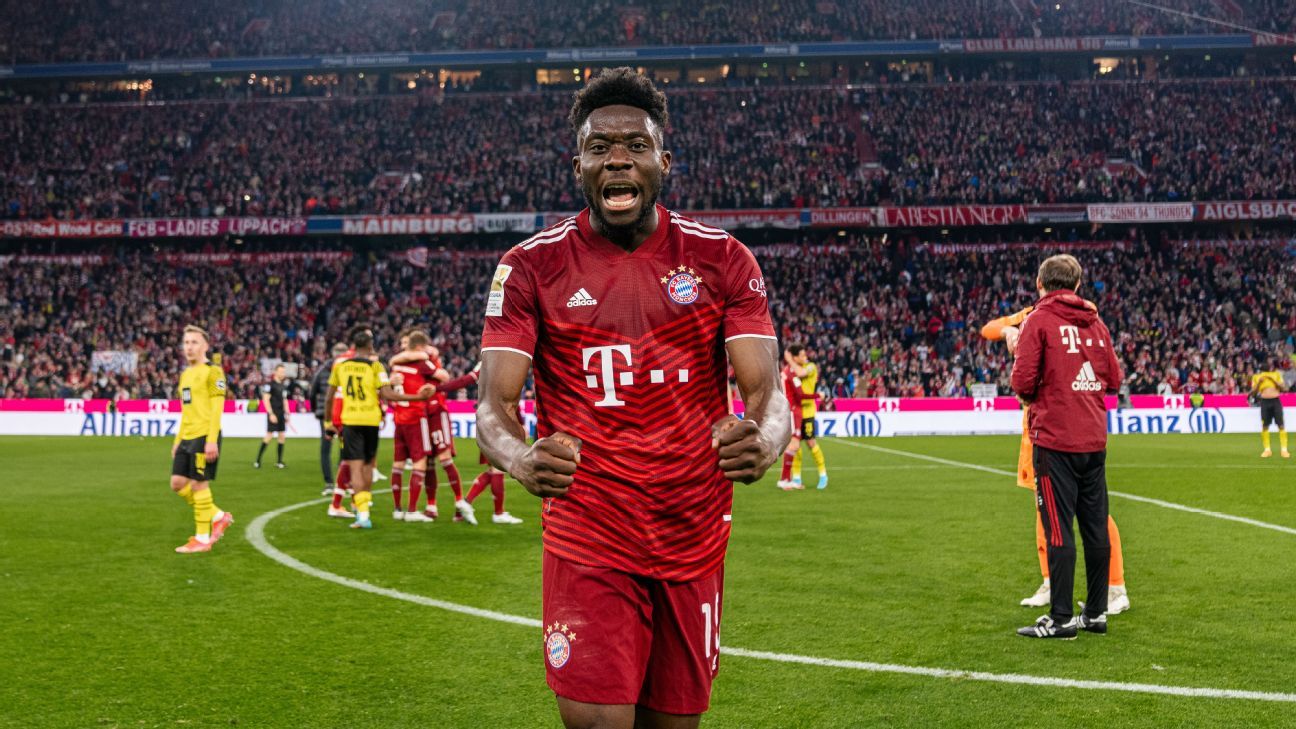Alphonso Davies won his fourth Bundesliga title on Saturday — his 11th piece of silverware at Bayern Munich since he joined the club in January 2019, a remarkable accomplishment by any measure. From arriving as an inexperienced but hugely promising left winger from Major League Soccer’s Vancouver Whitecaps, he has developed into one of the world’s best defenders and a key player in Bayern Munich’s active dynasty of success.
Davies’ speed is frightening, but he’s far more than just a rapid wing-back. He has developed his all-court game to the extent he was recognised by FIFA in 2020 when he made their World XI. But this season has been tougher. He was adjusting to life under new coach Julian Nagelsmann — having previously thrived under Hansi Flick — and was starting every week, but then came the unexpected news that would force him to take some time away from the game.
After testing positive for COVID-19 during the winter break, the illness left him with inflamed heart muscles, a condition called myocarditis. Nagelsmann revealed the news in early January; the only cure was for Davies to stop playing. From someone who’s used to operating at eye-wateringly high speeds, he needed to keep his heart rate low. He had to slow down; by his own admission, Davies told ESPN he became a “couch potato,” watching his Canada teammates qualify for their first men’s World Cup in 36 years, and seeing Bayern Munich close in on their 10th straight Bundesliga title.
But on April 6, Davies returned to the pitch and when Bayern Munich defeated Borussia Dortmund 3-1 in Saturday’s Der Klassiker to confirm their title, Davies was playing left-back, flying up and down the wing like it was 2020 all over again.
– O’Hanlon: So, who’s qualifying for next season’s Champions League? (E+)
– ESPN+ viewers guide: LaLiga, Bundesliga, MLS, FA Cup, more
Davies sat down with ESPN last week to look at his life as a football star, a phenomenon on Twitch and his responsibilities as a United Nations High Commissioner for Refugees (UNHCR) ambassador, something that means a huge amount to him as he grew up a refugee in Ghana before emigrating to Canada at age five.
This is the definitive look at Davies’ present and future and how he has tailored his game to excel under Nagelsmann, while also being Canada’s focal point under John Herdman. The man himself says “it doesn’t matter wherever the coach plays me, I just try to do the best I can.” With the 2022 World Cup later this year and Bayern targeting further success next term, it’s frightening to think, but Davies, at 21 years old, is just getting started. — Hamilton
How it started; how it’s going
Davies’ parents fled Liberia during the country’s second Civil War, traveling to Ghana where Davies was born at a refugee camp in Buduburam. Davies has used his fame to help UNHCR as a goodwill ambassador. He has been keeping a close eye on recent events in Ukraine: “It’s been tough to see. I don’t know first-hand what they’re going through, but my parents do,” Davies tells ESPN. “They were [in the middle of a war] for so long and had to leave. It’s a traumatizing situation.”
When his family arrived in Canada in 2005, settling in Edmonton, Davies found himself on the soccer field, learning his craft at the Edmonton Strikers, to MLS and the Whitecaps before earning his move to the Bundesliga in July 2018. The move went through in January 2019, and he was used sparingly in that first season, playing mostly on the left wing. The next term he flitted between left wing and left wing-back, but when Niko Kovac was fired in November 2019, Flick transformed Davies into the first-choice full-back.
Davies won an incredible six trophies with Bayern in 2020 but after a remarkable breakout year, the 2020-21 season saw Davies battle ankle injuries, while this term was disrupted by his heart problems. It has been a formative experience.
“Injuries and poor performances are part of the game, but you can’t give up, you just have to keep fighting,” he says. “I know I have the quality to do it again, and I’m trying my best. This injury I’ve had [with the heart], it’s another step back, but I keep believing and keep on going.”
The heart scare stopped him in his tracks. He remembers recovering from COVID-19, doing a couple of training sessions, and then getting a call from the doctor. He was playing FIFA at the time. “The doctor said, ‘There’s something going on with your heart, you need to call me for further examination,'” Davies says. They told him he had to stop playing for a while. Weeks flew by, and his frustration grew.
– Stream ESPN FC Daily on ESPN+ (U.S. only)
– Don’t have ESPN? Get instant access
“I couldn’t do anything, I couldn’t even work out,” he adds. “I was a couch potato sitting at home, playing games every single day, finding ways to entertain myself. For an active guy, yeah, it was scary news.”
The disruption meant that for the final pair of key qualifiers for Canada, Davies was watching as his teammates booked their spot at Qatar 2022. He streamed the entire experience on Twitch, where he’s already a well-loved FIFA player with 314,000 subscribers. His TikTok following is now at six million — with 90.5 million likes — as he brings fans into daily life with his girlfriend and professional footballer, Olympic gold medalist with Canada, and Paris Saint-Germain forward Jordyn Huitema.
But the experience of watching his Canada teammates was different. As they lost 1-0 to Costa Rica, he did his best to keep a straight face as passes went askew or moves broke down, knowing his reactions would be interpreted one way or another. After that defeat, they needed to beat Jamaica to qualify. Davies watched on from Munich, attempting to keep a poker face.
“Watching the game as a fan you see the outside noise, and it was nerve-wracking watching as a fan,” Davies says. “We knew Jamaica are a strong team, and this was a must-win one. I sent the boys a little good luck text, sat down and watched. They put in a brilliant performance.”
When the final whistle blew after an impressive 4-0 win, Davies broke down into tears. “I’m going to the World Cup. We’re going to the World Cup, man! I cannot believe it,” he said at the time. “I’m tearing up. My dream has come true.”
How Davies plays for Bayern
As a 17-year old for the Whitecaps, Davies combined eight goals with 11 assists from what was primarily a wide midfield role in 2018. It was quickly evident that his dribbling skills were nearly as advanced as his otherworldly speed, and Bayern swooped in that summer.
Even for those watching his man-against-boys routine in MLS, it was shocking how quickly he worked his way up to the top in Europe. When Flick took the Bayern job from the struggling Kovac midway through the 2019-20 campaign, he moved veteran David Alaba to primarily a centre-back role and, recognizing that Davies was fast enough to play two positions at once, basically asked the 19-year old to play the left-midfield and left-back roles simultaneously.
“My speed is one of my biggest assets,” Davies said. “I try to use it as much as possible. As a defender, especially when your opponent is going toward your goal, your first instinct is, you have to stop him at all costs. That’s what I try to do.”
Opposing right wingers constantly thought they were building solid counterattacks, only to watch Davies intercept the ball out of nowhere. In attack, he sacrificed individual production in the name of creating ultimate width and pressure on the outside, yet he also produced eight assists (6th on the team) and 316 ball recoveries (2nd) as Bayern swept through every competition.
Recent seasons have seen further positional shifts. In 2020-21, he battled injuries and played a more conservative role in part because of Bayern’s more comprehensive struggles in transition defense. Only 27.8% of his touches came in the attacking third, down slightly from 30.4% in 2019-20, and he went from averaging 1.5 chances created and 0.24 xG+xA per 90 minutes to 1.1 and 0.12, respectively. But in 2021-22, Nagelsmann has reversed that trend.
“We all know Nagelsmann is a young coach, and he has a lot of brilliant ideas that he wants to implement in the game,” Davies says of the 34-year old. “We play different structures and different formations. When we have the ball, we play a back three; when we don’t, we play a back four, and basically you try to give our wingers opportunities to go directly to the goal. Our full-backs support them.”
With Nagelsmann using only three at the back in build-up play, Davies has once again been asked to drift further up the pitch. This season, 38.5% of his touches have come in the attacking third, and while his ball recovery and defensive intervention totals are down, his productivity in attack has risen to 1.7 chances created and 0.39 xG+xA per 90 minutes. He has yet to score in league play, but it’s only a matter of time — he has set career highs in both shot attempts and xG created in the Bundesliga.
With each progressive season, Davies’ role has shifted slightly, but the goal remains primarily the same: Play two positions at once. — Connelly
2:10
Alphonso Davies tells Archie Rhind-Tutt about missing months of the season with myocarditis.
How Davies plays for Canada
Of course, learning and adapting to different tactics is nothing new for Davies: he does it every time he reports for the national team. While 97% of his minutes with Bayern have been played within what Stats Perform deems as a left-back or left-midfield role, he does a little bit of everything with Canada: Over the past three years, he has recorded 43% of his minutes on the left wing, 46% as a left wing or left midfielder … and 10% as a center forward.
The differences in usage are subtle, but noticeable.

Wearing the Canada shirt, Davies has been far more likely to not only touch the ball in attacking areas of the pitch, but also drift in from the left.

“At Bayern, when you have the caliber of players they have — amazing players, World Cup winners, Champions League winners — it’s me doing my job, wherever the coach puts me,” Davies says. “For Canada, I play a little bit higher up the pitch, and [in Munich] I play defense. But for me it doesn’t matter. Wherever the coach puts me, I try to do the best I can.”
Whereas Bayern are a prototypical, ball-dominant club team — their 64% possession rate is third highest among teams in Europe’s “Big Five” leagues this season — Canada have found success in giving opponents the ball and springing counterattacks. Their possession rate in World Cup qualification was only 49.2%, fifth among eight teams, and they attempted just 123 total shots, sixth most. But they scored the most goals in the group and allowed the fewest.
One can easily see that counterattacks are another way of using Davies’ speed, and the style has looked good on him. Over the past three years, he has played 1,702 minutes for Canada — just about what he’ll finish this Bundesliga season with — and has produced seven goals (5th most on the squad) and 10 assists (1st) among 51 chances created (1st). In the seven matches in which he produced at least one assist, Canada produced 14 points, including a big win over Panama and draws against Mexico and the United States in World Cup qualification. In the six matches in which he scored, Canada won all six, including a 2-0 win over the U.S. in 2019.
The Canada national team has more exciting young talent now than at perhaps any point in its history. Jonathan David played a major role in Lille‘s shocking Ligue 1 title run in 2020-21, and attackers Cyle Larin (Besiktas) and Tajon Buchanan (Club Brugge) both play for solid, middleweight clubs in Europe. When Davies was on the sideline dealing with his heart issue this winter, the team was able to maintain their strong standing.
But for them to make noise in a very tough 2022 World Cup group — they drew Belgium, Croatia and Morocco in Group F — they will need not only Davies’ full skillset, but his leadership as well. Though still only 21, he has already played in more high-profile, high-leverage matches than almost any Canadian ever.
“Being a leader doesn’t mean bossing everyone around, you know,” Davies says. “It doesn’t mean telling people what to do. It’s the hunger that you have to win the game, the hunger you have to fight for your team and protect your team on the pitch and just be vocal.
“I don’t mean telling people where they’re wrong or where to go. Give them good information and motivate the team as much as possible.” — Connelly
What does the future hold?
Since Davies’ comeback against Villarreal on April 6, Bayern have emphasised it will take time for him to get back up to speed. “You could see that he still needs some time to find his rhythm and be his old self again,” Nagelsmann said after their 1-0 defeat to Villarreal in Spain. The Spanish side would go on to knock the Germans out of the Champions League at the quarterfinal stage, drawing 1-1 at the Allianz Arena.
Davies came in for criticism for the key goal, as he played Samuel Chukwueze onside, just a minute after he came on as a substitute for Lucas Hernandez. But Davies knows managing the ebb and flow of the game is all part of his development. “As you can see, I didn’t really contact with the ball properly, but this is football.” After the match he struggled to sleep. He called Huitema and talked the match through with her.
It’s a mark of Davies and Bayern Munich that they won’t be satisfied with just winning the Bundesliga this season. This is a team built on targeting multiple trophies per season, with the Champions League the goal. “Winning the Bundesliga is a tremendous accomplishment, but you know, we’re hungry, we want more,” he says.
It seems like Bayern are going through a stage of evolution as off-field discussions continue with veterans Robert Lewandowski, Thomas Muller and Manuel Neuer regarding new contracts at the club. “I don’t really pay attention to that but on the pitch, we motivate each other,” Davies says. “You know we have good young players coming through like [16-year-old midfielder] Paul Wanner … and look at [19-year-old forward] Jamal Musiala, the future’s bright! These kids are hungry, the veterans are hungry, and yeah, we’re ready. We’re ready for the fight, and there’s a brighter future for us coming forward.”
Davies has already managed one of his mentors leaving, when Alaba left to join Real Madrid on a free transfer last summer. “I used to watch the ball a little bit, but he [Alaba] always kept me on my toes,” he says. “You know I sometimes tell Lucas [Hernandez] that I have this voice in the back of my head, and that’s David’s voice, so I always check my shoulder to see where the opponent is.”
Davies is contracted to Bayern Munich until 2025 and will start next season as one of their pivotal players. But looming large on the horizon is the World Cup in Qatar where he should be one of the brightest stars. He’s part of this superb group of young Canadians, like David and Liam Millar, and they’re hoping to spring a surprise at the sport’s biggest competition.
For Canada, it has been 36 years in the waiting — something his Bayern teammates reminded him of — and he’s ready to take his country to the global stage. “They made jokes, but they all said congratulations,” Davies says. “They know the history but thy respected that we made it as it’s every footballer’s dream. Every footballer wants to play in the World Cup for their country. It’s a really cool moment for me.” — Hamilton


